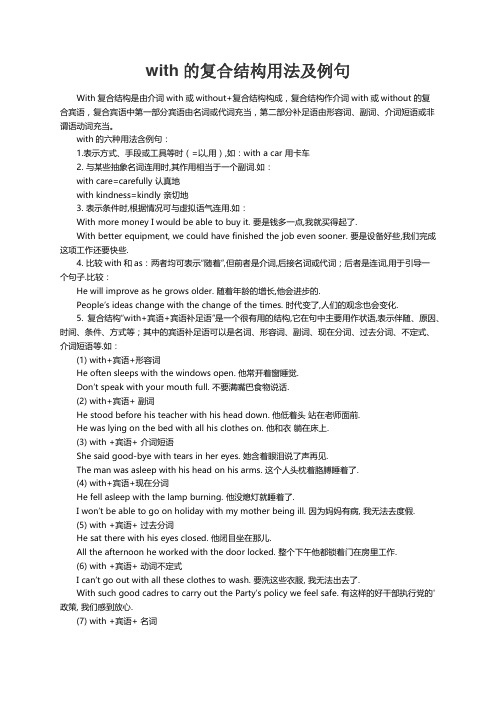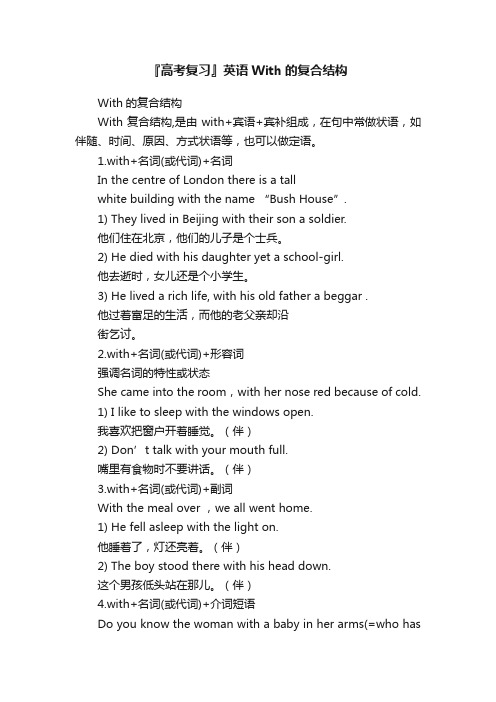with的复合结构用法及练习
with复合结构讲解及练习分析

_________and no way to reduce her pain and suffering from the terrible disease, the patient sought her doctor 's help to end her life .(2005年江苏省高考试题) A .Having given up hope of cure B. With no hope for cure C . There being hope for cure D. In the hope of cure [解析] 答案 B。此题考查with的复合结构作状语的用法。逗号前 的内容作状语,该部分是由介词with构成的短语及现在分词短语 suffering from the terrible disease构成的,介词with有两个 宾语,分别是 no hope for cure和 no way to reduce her pain。句意是:这位病人由于没有治愈的希望和减轻其痛苦的方 法,她饱受疾病煎熬,于是请求大夫结束她的生命。
三. with复合结构作状语
1. 表示伴随状况 She left the office with tears in her eyes. 她眼里含着泪,离开了办公室。 He was covered with a national flag with his face exposed. 一面国旗盖在他身上,脸露在外面。
[解析] 答案B。本题也是考查with复合结构用法的,表示一种伴随 情况。介词for与as虽具有“由于、因为” 之意,但其后要跟从 句,,like没有“由于、因为” 之意,应该排除A、C、D,答案是 B。句意是:随着旧工厂被成功地改制为艺术中心,许多大城市 (如利物浦和纽约)都做着这方面的尝试。
with复合结构例句

with复合结构例句
with的8种复合结构用法例句如下所示:
1、with +宾语+名词
He died with his daughter a schoolgirl.他在他女儿是个小学生的时候死了。
2、with+名词(或代词)+补语
He wondered if he could slide out of the lecture hall without anyone noticing.他想他是否可以在没有人注意到他的情况下悄悄溜出演讲大厅。
3、with +名词(或代词)+过去分词
She had to walk home with her bike stolen.自行车被偷,她只好步行回家。
4、with +名词(或代词)+现在分词
With the crowds cheering, they drove to the palace.在人群的欢呼声中,他们驱车来到皇宫。
5、with+名词(或代词)+非谓语动词
With a lot of work to do, he wasn't allowed to go out.因为还有很多工作要做,他没有被允许外出。
6、with+名词(或代词)+介词短语
He walked into the dark street with a stick in his hand.他走进黑暗的街道时手里拿着根棍子。
7、with+名词(或代词)+副词
She left the room with all the lights on.她离开了房间,灯还亮着。
8、with+名词(或代词)+形容词
I like to sleep with the windows open.我喜欢把窗户开着睡觉。
With的复合结构及练习

With+名词/代词 +ing分词 与+to do区别
• With the boy leading the way,we found he house easily.
• With the boy to lead the way,we will find the house easily tomorrow.
succeed. A. help B. helped
√C. to help D. helps
二、with复合结构的句法作用 with复合结构,即“with + 宾语+补足语”, 在句子中可以充当状语和定语。
1.充当伴随或方式状语
It's bad manners to speak with one's mouth full of food.
6.with + 宾语 + 过去分词 (动宾关系)
With the work done, she felt greatly relieved. 工作完成了,她大大地松了一口气。
7.with + 宾语 + 不定式 (将要发生)
With her to go with us, we're sure to have a pleasant journey.ith a native our guide, we needn't be afraid to get lost.
有本地人当向导,我们不必担心会迷路。
5.with + 宾语 + 现在分词 (主谓关系)
With summer coming, the weather is becoming hotter and hotter. 随着夏天的到来,天气越来越热。
with的复合结构用法及例句

with的复合结构用法及例句With复合结构是由介词with或without+复合结构构成,复合结构作介词with或without的复合宾语,复合宾语中第一部分宾语由名词或代词充当,第二部分补足语由形容词、副词、介词短语或非谓语动词充当。
with的六种用法含例句:1.表示方式、手段或工具等时(=以,用),如:with a car 用卡车2. 与某些抽象名词连用时,其作用相当于一个副词.如:with care=carefully 认真地with kindness=kindly 亲切地3. 表示条件时,根据情况可与虚拟语气连用.如:With more money I would be able to buy it. 要是钱多一点,我就买得起了.With better equipment, we could have finished the job even sooner. 要是设备好些,我们完成这项工作还要快些.4. 比较with和as:两者均可表示“随着”,但前者是介词,后接名词或代词;后者是连词,用于引导一个句子.比较:He will improve as he grows older. 随着年龄的增长,他会进步的.People’s ideas change with the change of the times. 时代变了,人们的观念也会变化.5. 复合结构“with+宾语+宾语补足语”是一个很有用的结构,它在句中主要用作状语,表示伴随、原因、时间、条件、方式等;其中的宾语补足语可以是名词、形容词、副词、现在分词、过去分词、不定式、介词短语等.如:(1) with+宾语+形容词He often sleeps with the windows open. 他常开着窗睡觉.Don’t speak with your mouth full. 不要满嘴巴食物说话.(2) with+宾语+ 副词He stood before his teacher with his head down. 他低着头站在老师面前.He was lying on the bed with all his clothes on. 他和衣躺在床上.(3) with +宾语+ 介词短语She said good-bye with tears in her eyes. 她含着眼泪说了声再见.The man was asleep with his head on his arms. 这个人头枕着胳膊睡着了.(4) with+宾语+现在分词He fell asleep with the lamp burning. 他没熄灯就睡着了.I won’t be able to go on holiday with my mother being ill. 因为妈妈有病, 我无法去度假.(5) with +宾语+ 过去分词He sat there with his eyes closed. 他闭目坐在那儿.All the afternoon he worked with the door locked. 整个下午他都锁着门在房里工作.(6) with +宾语+ 动词不定式I can’t go out with all these clothes to wash. 要洗这些衣服, 我无法出去了.With such good cadres to carry out the Party’s policy we feel safe. 有这样的好干部执行党的'政策, 我们感到放心.(7) with +宾语+ 名词He died with his daughter yet a schoolgirl. 他去世时,女儿还是个小学生.With复合结构:一、with或without+名词/代词+形容词例句:1.I like to sleep with the windows open.我喜欢把窗户开着睡觉。
With复合结构的用法小结

With复合结构的用法小结及练习一、with结构的构成它是由介词with或without+复合结构构成,复合结构作介词with或without的复合宾语,复合宾语中第一部分宾语由名词或代词充当,第二部分补足语由形容词、副词、介词短语、动词不定式或分词充当,分词可以是现在分词,也可以是过去分词。
With结构构成方式如下:1. with或without-名词/代词+形容词;2. with或without-名词/代词+副词;3. with或without-名词/代词+介词短语;4. with或without-名词/代词+动词不定式;5. with或without-名词/代词+分词。
下面分别举例:1、She came into the room,with her nose red because of cold.(with+名词+形容词,作伴随状语)2、With the meal over ,we all went home.(with+名词+副词,作时间状语)3、The master was walking up and down with the ruler under his arm。
(with+名词+介词短语,作伴随状语。
)The teacher entered the classroom with a book in his hand.4、He lay in the dark empty house,with not a man ,woman or child to say he was kind to me.(with+名词+不定式,作伴随状语)He could not finish it without me to help him.(without+代词+不定式,作条件状语)5、She fell asleep with the light burning.(with+名词+现在分词,作伴随状语)Without anything left in the cupboard,she went out to get something to eat.(without+代词+过去分词,作为原因状语)二、with结构的用法在句子中with结构多数充当状语,表示行为方式,伴随情况、时间、原因或条件(详见上述例句)。
with复合结构做定语

with复合结构做定语在英语语法中,with复合结构是一种常见的用法,它可以用作名词、形容词和副词的修饰语。
本文将围绕着with复合结构做定语这一主题展开,介绍其用法、例句以及常见的注意事项。
一、用法1.作名词的定语with复合结构可以用来修饰名词,指明该名词的性质、特点或用途。
例如:- a book with a red cover(一个有红色封面的书)- a girl with long hair(一个长发的女孩)- a house with a big garden(一个有大花园的房子)2.作形容词的定语with复合结构还可以用来修饰形容词,强调某种特定的性质或状态。
例如:- a girl with beautiful eyes(一双美丽的眼睛的女孩)- a man with a kind heart(一个有善良心地的人)- a car with high performance(一辆性能出色的车)3.作副词的定语with复合结构还可以用来修饰副词,表示某种方式或方式。
例如:- walk with confidence(自信地行走)- speak with fluency(流利地说话)- eat with chopsticks(用筷子吃饭)二、例句为了更好地理解with复合结构做定语的用法,以下是一些例句:1. She is a girl with a sweet smile.(她是一个笑容甜美的女孩。
)2. I bought a watch with a leather strap.(我买了一块有皮带的手表。
)3. He is a man with a great sense of humor.(他是一个有幽默感的人。
)4. We visited a museum with ancient artifacts.(我们参观了一个有古代文物的博物馆。
)5. The house is decorated with beautiful paintings.(这个房子装饰着美丽的画作。
『高考复习』英语With的复合结构

『高考复习』英语With的复合结构With的复合结构With复合结构,是由with+宾语+宾补组成,在句中常做状语,如伴随、时间、原因、方式状语等,也可以做定语。
1.with+名词(或代词)+名词In the centre of London there is a tallwhite building with the name “Bush House”.1) They lived in Beijing with their son a soldier.他们住在北京,他们的儿子是个士兵。
2) He died with his daughter yet a school-girl.他去逝时,女儿还是个小学生。
3) He lived a rich life, with his old father a beggar .他过着富足的生活,而他的老父亲却沿街乞讨。
2.with+名词(或代词)+形容词强调名词的特性或状态She came into the room,with her nose red because of cold.1) I like to sleep with the windows open.我喜欢把窗户开着睡觉。
(伴)2) Don’t talk with your mouth full.嘴里有食物时不要讲话。
(伴)3.with+名词(或代词)+副词With the meal over ,we all went home.1) He fell asleep with the light on.他睡着了,灯还亮着。
(伴)2) The boy stood there with his head down.这个男孩低头站在那儿。
(伴)4.with+名词(或代词)+介词短语Do you know the woman with a baby in her arms(=who hasa baby in her arms)?1) With the children at school, we can't take our vacation when we want to.由于孩子们在上学,所以当我们想度假时而不能去度假。
with复合结构及翻译练习

With复合结构with结构是许多英语复合结构中最常用的一种。
形式非常灵活,表达的意思也多种多样,在单选、完形中经常出现,且写作文时是很好的加分表达方式。
with结构的构成它是由介词with或without+复合结构构成,复合结构作介词with或without的复合宾语,复合宾语中第一部分宾语由名词或代词充当,第二部分补足语由形容词、副词、介词短语、动词不定式或分词充当,分词可以是现在分词,也可以是过去分词。
With结构构成方式如下:with或without-名词/代词+形容词例句:He is used to sleeping with the windows open.with或without-名词/代词+副词例句:She left the room with all the lights on.with或without-名词/代词+介词短语例句:He walked into the dark street with a stick in his hand.with或without-名词/代词 +动词不定式例句:With so much work to do, I have no time for a holiday.with或without-名词/代词 +分词例句:We found the house easily with the little boy leading the way.(现在分词表示主动动作,即分词所表示的动作是由with后的宾语发出来的) With all the things she needed bought, she went home happily.(过去分词表示被动,with后面的宾语与过去分词之间是被动关系)without+名词/代词+补语例句:Possibly this person died without anyone knowing where the coins were hidden.He wondered if he could slide out of the lecture hall without anyone noticing (him).with the winter is comingwith+不定式和+分词的区别加不定式是指将要进行的动作,加分词是指主动或被动动作.with复合结构的句法功能with 复合结构,在句中表状态或说明背景情况该结构常做伴随、方式、原因、条件等状语。
- 1、下载文档前请自行甄别文档内容的完整性,平台不提供额外的编辑、内容补充、找答案等附加服务。
- 2、"仅部分预览"的文档,不可在线预览部分如存在完整性等问题,可反馈申请退款(可完整预览的文档不适用该条件!)。
- 3、如文档侵犯您的权益,请联系客服反馈,我们会尽快为您处理(人工客服工作时间:9:00-18:30)。
with复合结构一. with复合结构的常见形式1.“with+名词/代词+介词短语”。
The man was walking on the street, with a book under his arm.那人在街上走着,腋下夹着一本书。
2. “with+名词/代词+形容词”。
With the weather so close and stuffy, ten to one it’ll rain presently.天气这么闷热,十之八九要下雨。
3. “with+名词/代词+副词”。
The square looks more beautiful than even with all the light on. 所有的灯亮起来,广场看起来更美。
4. “with+名词/代词+名词”。
He left home, with his wife a hopeless soul. 他走了,妻子十分伤心。
5. “with+名词/代词+done”。
此结构过去分词和宾语是被动关系,表示动作已经完成。
With this problem solved, neomycin 1 is now in regular production.随着这个问题的解决,新霉素一号现在已经正式产生。
6. “with+名词/代词+-ing分词”。
此结构强调名词是-ing分词的动作的发出者或某动作、状态正在进行。
He felt more uneasy with the whole class staring at him. 全班同学看着他,他感到更不自然了。
7. “with+宾语+to do”。
此结构中,不定式和宾语是被动关系,表示尚未发生的动作。
So in the afternoon, with nothing to do, I went on a round of the bookshops.由于下午无事可做,我就去书店转了转。
二. with复合结构的句法功能1. with 复合结构,在句中表状态或说明背景情况,常做伴随、方式、原因、条件等状语。
With machinery to do all the work, they will soon have got in the crops.由于所有的工作都是由机器进行,他们将很快收完庄稼。
(原因状语)The boy always sleeps with his head on the arm. 这个孩子总是头枕着胳膊睡觉。
(伴随状语)The soldier had him stand with his back to his father. 士兵要他背对着他父亲站着。
(方式状语)With spring coming on, trees turn green. 春天到了,树变绿了。
(时间状语)2. with 复合结构可以作定语Anyone with its eyes in his head can see it’s exactly like a rope. 任何一个头上长着眼睛的人都能看出它完全像一条绳子。
【高考链接】1. ___two exams to worry about, I have to work really hard this weekend.(04北京)A. WithB. BesidesC. As forD. Because of【解析】A。
“with+宾语+不定式”作状语,表示原因。
2. It was a pity that the great writer died, ______his works unfinished. (04福建)A. forB. withC. fromD.of【解析】B。
“with+宾语+过去分词”在句中作状语,表示状态。
3._____production up by 60%, the company has had another excellent year. (NMET)A. AsB.ForC. WithD.Through【解析】C。
“with+宾语+副词”在句中作状语,表示程度。
with复合结构专项练习(一)1. John received an invitation to dinner, and with his work _______, he gladly accepted it.A. finishedB. FinishingC. having finishedD. was finished2. Now that we’ve discussed our problem, are people happy with the decisions ________?A. takingB. TakeC. takenD. to take3. You have no idea how she finished the relay race _______ her foot wounded so much.A. forB. WhenC. withD. while4. ----Come on, please give me some ideas about the project.----Sorry. With so much work _______ my mind, I almost break down.A. filledB. FillingC. to fillD. being filled5. John received an invitation to dinner, and with his work ______, he gladly accepted it.A. finishedB. FinishingC. having finishedD. was finished6. I couldn’t do my homework with all that noise _______.A. going onB. goes onC. went onD. to go on7. _______ and no way to reduce her pain and suffering from the terrible disease, the patient sought h er doctor’s help to end her life.A. Having given up hope of cureB. With no hope for cureC. There being hope for cureD. In the hope of cure8. ________ two exams to worry about, I have to work really hard this weekend.A. WithB. BesidesC. As forD. Because of9. It was a pity that the great writer died _______ his works unfinished.A. forB. WithC. fromD. of10. ______ production up by 60%, the company has had another excellent year.A. AsB. ForC. WithD. Throughwith复合结构专项练习(二)一:请选择最佳答案1. With nothing_______to burn,the fire became weak and finally died out.A.leavingB.leftC.leaveD.to leave2. The girl sat there quite silent and still with her eyes_______on the wall.A.fixingB.fixedC.to be fixingD.to be fixed3. I live in the house with its door_________to the south.A.facingB.facesC.facedD.being faced4. They pretended to be working hard all night with their lights____.A.burnB.burntC.burningD.to burn二:用with复合结构完成下列句子1)___________________(有很多工作要做),I couldn't go to see the doctor.2)She sat___________________(低着头)。
3)The day was bright____________________.(微风吹拂)4)_________________________,(心存梦想)he went to Hollywood.三把下列句子中的划线部分改写成with复合结构。
1)Because our lessons were over,we went to play football._____________________________.2)The children came running towards us and held some flowers in their hands._____________________________.3)My mother is ill,so I won't be able to go on holiday._____________________________.4)An exam will be held tomorrow,so I couldn't go to the cinema tonight._____________________________.答案:1. A 2. C 3. C 4. B 5. A 6. A 7. B 8. A 9. B 10. Cwith复合结构专项练习(二)答案(一):1)答案是B.with的宾语nothing和动词leave是被动关系,所以用过去分词形式作宾语补足语。
2)答案是B.短语fix one's eyes onsth是“盯着……看”的意思,所以句中hereyes和动词fix是被动关系,所以用过去分词。
3)答案是A.face“朝、向”,是不及物动词,所以和itsdoor是主动关系,所以用现在分词形式。
4)答案是C.burn“点燃、发亮、发光”,是不及物动词,所以和theirlights是主动关系,所以用现在分词。
